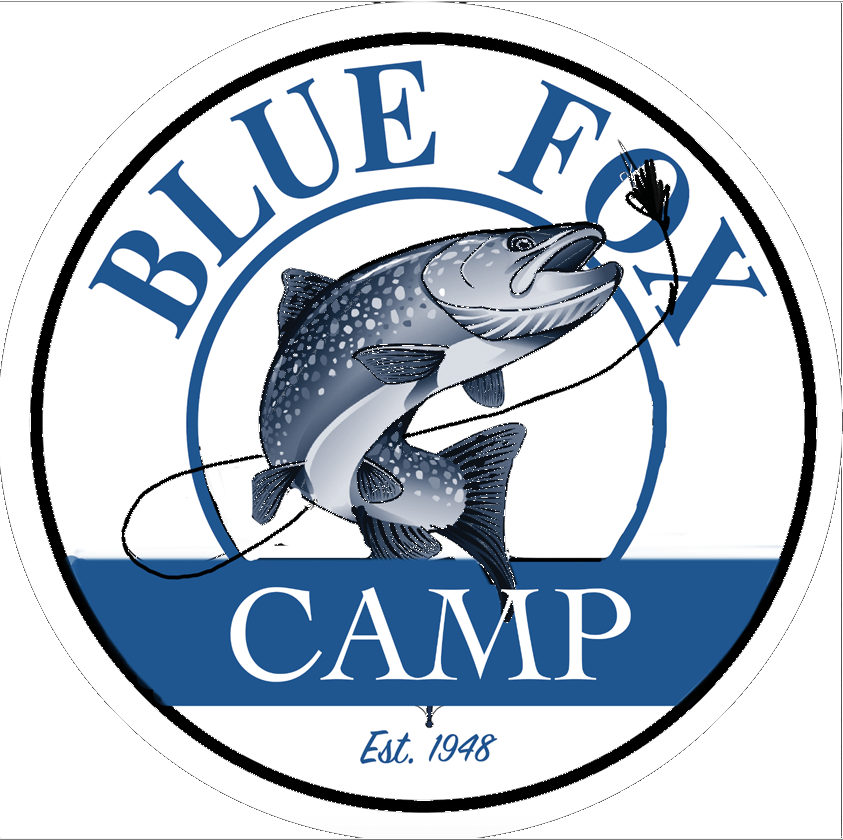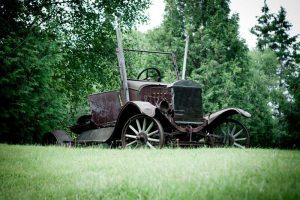
Origins
Blue Fox Camp started as a logging camp in the early part of the last century. In the 1940's, trout were introduced to the Blue Lake area in 1944 by Vic Rutledge, who was one of the first to realise the recreational potential there. Vic carried several dozen rainbow trout fingerlings from the Ganaraska Trout Farm in milk cans along the 27 kilometre Blue Lake Trail. After stopping every hour at spring or creeks to replenish the water supply, Rutledge managed to get the fish in and release them into Blue Lake. By the end of that decade, they'd moved upstream from Blue Lake into Robb, Townline, Elbow and White Bear Lakes, and downstream into Dougall and Endikai lakes. Lake trout and brook trout were stocked later, and all three species established naturalised populations throughout the area. There has been no stocking of the major naturalised waters since the late 1950s and the mix of lake trout, rainbow trout and brook trout has been recognized as the province's only self-sustaining inland three-species trout system. Each of the three species has developed into a unique strain often unlike any others seen in Ontario. The rainbows are loaded with black spots over their entire bodies–similar to those of Alaska. They are robust fish, with tremendous splashes of burgundy, hot pink and olive-green. The lakers are also heavily spotted and a dusky bronze, sometimes fading to bluish-grey. The brook trout are stocky, tough fighters and an array of orange-red colours when caught in the fall.
1940-1960
Originally called Blue Lake Camp, the origins as a logging camp can be seen in some of the small trout lakes to the south of the camp, which were actually blast pits made by the loggers needing watering areas for the horses hauling logs. By the mid-1940s, however, Blue Fox changed from lumber camp to fishing resort when the first owners, Clarence (Foggy) Swiss, and Vic Rutledge bought the camp and surrounding land from the Canadian government. Clarence was a WW2 pilot, and according to local legend, was famous for his ability to fly through the fog. This gave rise to the nickname “Foggy”, and a lake behind Cabin 5 was named Foggy Swiss in his honour. Being a military veteran allowed Clarence to purchase the logging camp through the Veterans Land Act. His partner Vic worked at the logging camp and part of his contribution towards the purchase was the 1927 Ford Model T that still resides in camp. Vic also has a lake named in his honour, Rutledge Lake.
1960-1972
Clarence and Vic eventually sold Blue Fox Camp to Earl Tapp in the late 1950’s or early 1960’s. The creek running through camp that connects to Moose and Round lakes is called Tapp Creek in honour of Earl.
1972-1991
In the early 1970’s, Earl sold the camp to Charlie and Marion Fox. The original name of the camp (Blue Lake Camp) was changed to Blue Fox Camp, a combination of the local name of Kirkpatrick Lake (Blue) and the Fox’s last name. Charlie was a retired police officer from Toronto and in addition to the fishing camp they ran a number of kid’s camps and other programs at Blue Fox.
1991-2015
In 1991, the camp was sold to Dr. Paul Morgan, an oral surgeon from Toronto. Dr. Morgan (or Doc as he's known throughout the area) was the first to push for sustainable fishing practices, to try and combat the fish-and-take mentality from previous generations. Dr. Morgan recognized the beauty and uniqueness of the Blue Lake region and was instrumental in restoring the fishery to where it is today.
2015 and on
In 2013, Pete Roberts bought Air-Dale camp, a remote outpost on the east end of the lake. In 2015, Pete was part of the group of friends (along with Dan Nash, Brad Thorne and Mike VanHaaren) who bought Blue Fox Camp from Dr. Morgan. The current owners of Blue Fox Camp and Blue Fox Outpost have worked in and explored the Blue Lake System for many years and are committed to the preservation of the natural resources that make this area so special.
2022
In 2022 Brad Thorne left the Blue Fox team to pursue other interests. The experiences and friendships he gained during his 20 years at Blue Fox were some of the best times of his life.

